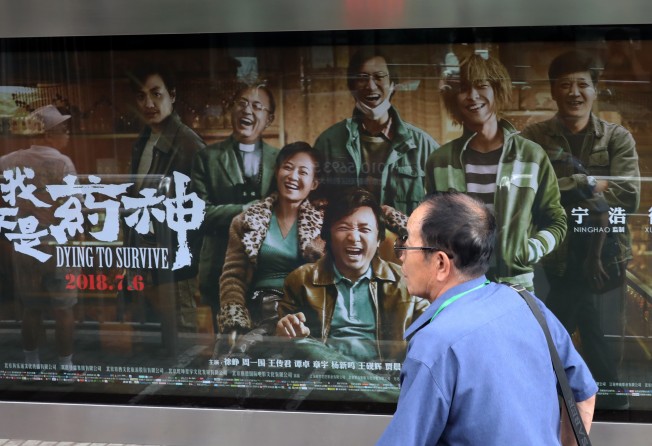Beijing should build on momentum to reform drug pricing
A film about the suffering that Chinese leukaemia patients endure has struck a chord with the public, strengthening the government’s hand in pursuing an overhaul of how foreign medications are priced

Exposure of systemically corrupt relations between pharmaceutical companies and mainland hospitals and doctors, such as kickbacks for prescribing expensive drugs, has done little to make medical care more affordable to ordinary Chinese. Not even revelations of a 3 billion yuan (HK$3.47 billion) cash-and-sex bribery case involving a multinational led to any effective reform of the system. But a low-budget hit movie called Dying to Survive, about a man who smuggles unapproved generic drugs from India that Chinese leukaemia patients can afford, looks set to make a real difference.
Screenings have raised awareness of the plight cancer patients face in paying for treatment, and seen Premier Li Keqiang order relevant departments to lower prices of some imported drugs and ensure a regular supply.
The move also reflects his frustration over the failure of the market to pass on savings generated by scrapping tariffs and taxes on certain medications.from May 1. Agents and institutions are apparently pocketing the benefits, which suggests nothing much has changed.
Beijing should follow the lead of some local authorities to extend medical insurance to cover life-saving cancer drugs. But in the longer term the central government needs to overhaul distribution and marketing and strengthen its hand in dealing with foreign drug makers, for example by shaking up the nation’s own pharmaceutical industry to shift the focus to the development of cancer drugs. Zhejiang Huahai Pharmaceutical’s recent recall of a blood-pressure medicine contaminated by a carcinogenic substance has done nothing for the local industry’s image.
Li has seized on the popularity of the movie to build public support for reform and increase pressure on local governments, agencies and vested interests who are resisting it. On the face of it, China is in a strong position to negotiate with foreign drug companies over reducing prices in return for greater access to the world’s biggest market.
But the reality is more complicated. Negotiations are slow going and further complicated by the outbreak of a trade war and the inclusion of pharmaceuticals in China’s technology and innovation-focused “Made in 2025” strategy, which is viewed as a threat by the United States.
Despite the complexity of the issue and conflict of interests, the increased public awareness created by the movie has provided an opening to pursue reform that has popular support, making it politically easier. If Beijing can capitalise on the groundswell and improve delivery of acute health care, momentum might build for enacting deeper reforms across other sectors of the economy.